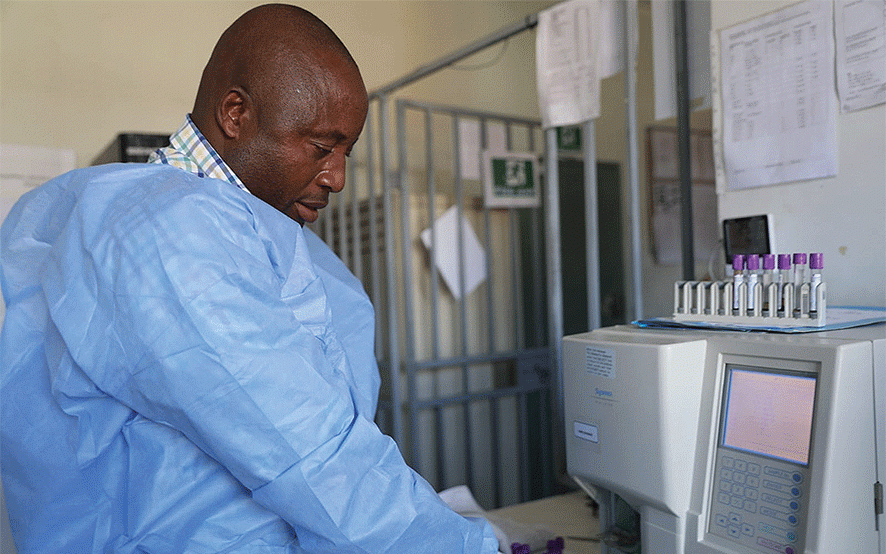
NECESSITY is the mother of invention, so says the old adage.
In an effort to catch up with the rest of the world, the Health and Child Care ministry, has invested in an electronic records system, known as e-health.
The system seeks to get rid of the archaic hardcopy system of keeping health records which is fast becoming a nightmare for health personnel amid shortages of storage cabinets and folders which are seriously hampering health institutions’ ability to quickly retrieve records and gather information for research.
E-Health is the use of telecommunications and computer technology to transmit and provide medical information and services.
Addressing journalists during a tour of the United Nations Development Programme (UNDP)’s solar for health projects in Chivi, district medical officer Onward Tendaupenyu said the system had come at an opportune time in their quest to go paperless.
“We conduct weekly disease surveillance systems where diseases such as cholera, measles, COVID, snake bites, rabies cases etc are captured and recorded. This data is recorded and is fed into the system.
"Before the e-health and solar projects, when grid electricity went off, the staff had to do manual filing and paper-based format which as a ministry is not in line with our vision. We want to go paperless by 2030 through Electronic Health Records (EHR),” he said.
The world has become one as interconnectedness intensifies leading to great improvements in communication systems and transport networks.
- Hesitancy slows Covid vaccination for children
- Hesitancy slows Covid vaccination for children
- Multisectoral COVID-19 messaging campaign improving prevention and vaccine uptake in Zimbabwe
- Cultivate demand for Covid-19 vaccines
Keep Reading
Zimbabwe is no exception and e-life has become the way of life, not only in the office or homes due to connectivity, but in every aspect, be it e-commerce, e-health, e-learning and online video chat and all those remarkable changes that the world has experienced in the past 20 years.
Tendaupenyu said the e-health system was making life easier for them as it came with a lot of advantages.
“That, coupled with the solar for health programme has kept us on uninterrupted power supply, thereby reducing tasks we would do when we were dependent on the manual system,” he said.
According to South African Journal of Information Management, the e-Health system is patient-centric and involves the use of modern information systems and technologies to integrate and co-ordinate the delivery of healthcare to ensure improved patient outcomes, greater efficiencies, and higher levels of transparency and improved ease of access.
Thorngrove Infectious Diseases Hospital and Pelandaba Clinic in Bulawayo are already enjoying the benefits of smooth EHR services which have been necessitated by the solar systems available at most of the clinics in the city.
Matabeleland South provincial medical director Andrew Muza said the system had been successfully adopted in the province.
“We are trying to go paperless, we want to capture health data in electronic format where someone is able to file their records even away from physical sites from where the services are accessed,” he said.
The World Health Organisation (WHO) says the migration to e-health is necessary in providing quality healthcare because it allows for seamless flow of health information among various entities.
“E-Health is gradually eliminating paper-based health and healthcare. Many countries are optimistic that e-health can also lower costs and expand access to health.
"Thus, e-health is becoming a reality in both developed and developing countries and holds great promise in improving global access to healthcare services and health informatics,” WHO said in a statement.
A pilot project for the system was conducted at Chitungwiza Hospital in 2014 and has seen the referral hospital keeping up to date with developments, while providing accurate and quality health services.
“At Chitungwiza Hospital more than a hundred desktop computers were installed in every department and ward that act as access points to the system.
"Thanks to a partnership with TelOne as the internet service provider, a fibre optic link enables fast connection to the central servers that are housed at ministry headquarters,” said one of the doctors at the institution during the implementation of the pilot project.
The e-health system uses the SAP health software application.
To log in into the system, health staff must first be approved by the Health ministry headquarters, as a security measure.
The system is being used to capture patient demographics, handle patients' accounts and even clinical information such as blood pressure, temperature and doctors’ notes. This enables the system to be a vital tool in disease surveillance.
In the event of power outages and network interruptions the data is initially collected on paper to be entered later though at many institutions, a solar back-up was put in place to further strengthen the system.
UNDP programme manager for the Global Fund project, Emmanuel Boadi said health information was essential for quality health service delivery and the solar for health project had strengthened the healthcare sector’s capacity to fully deploy digital health services without any interruption.
“For quality health service delivery, electricity is very important. We need power all the times to power the cold-chain, for the laboratories, for testing as part of quality health service delivery and also to make sure that all your health products are stored in World Health Organisation (WHO) recommended conditions.
“We also need power for the health information because we need timely data to analyse and inform decision making,” said Boadi.
The South African Journal of Information has however, noted that adoption of e-health systems has been low in developing countries which are confronted with challenges of insufficient e-health infrastructure and lack of technical expertise and computer skills.
Consequently, the global state of e-health implies that the implementation of e-health systems does not solely depend on the availability of technology, but on other factors such as technical support in medical institutions and lack of skills in information and communication technolgy among health practitioners.










